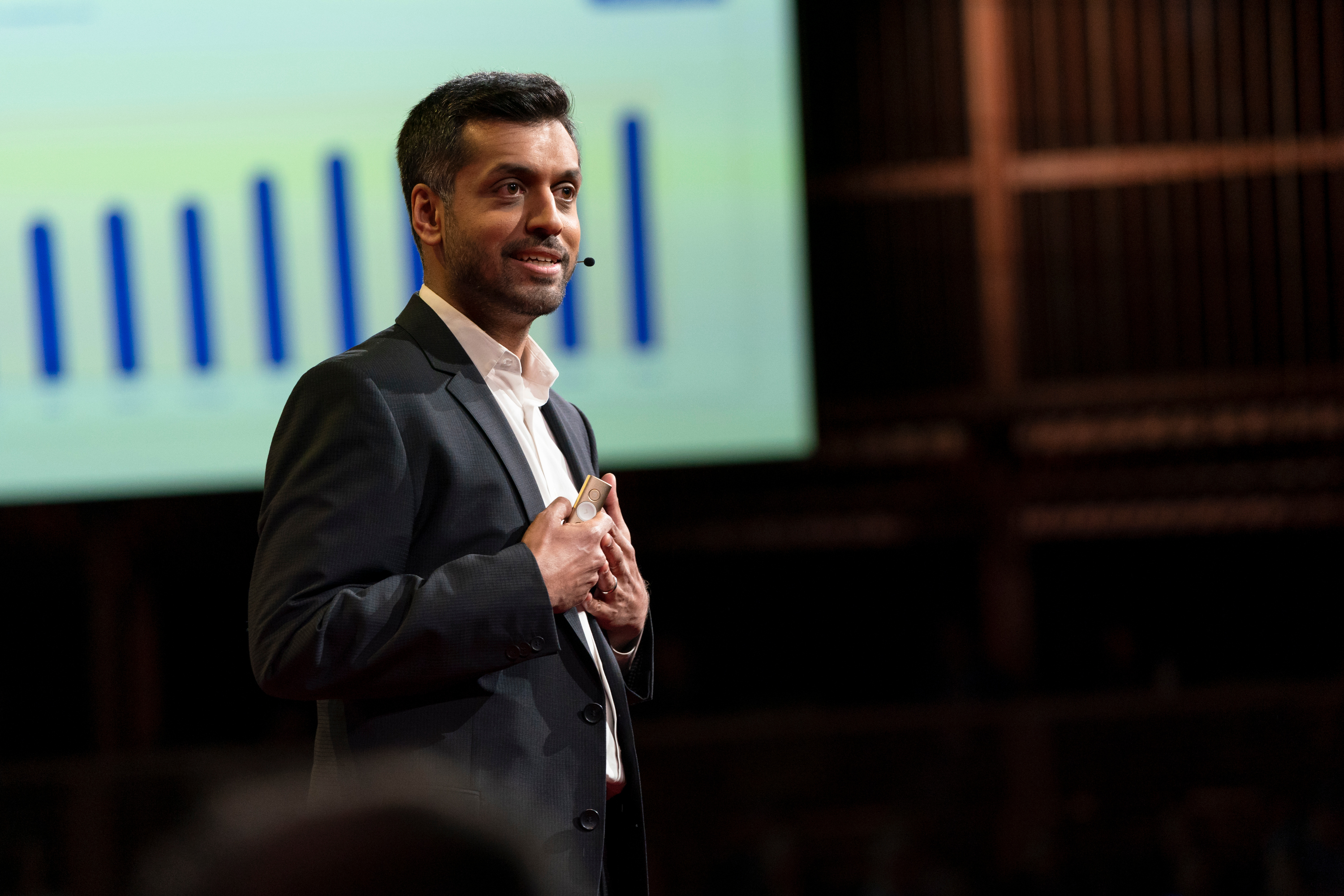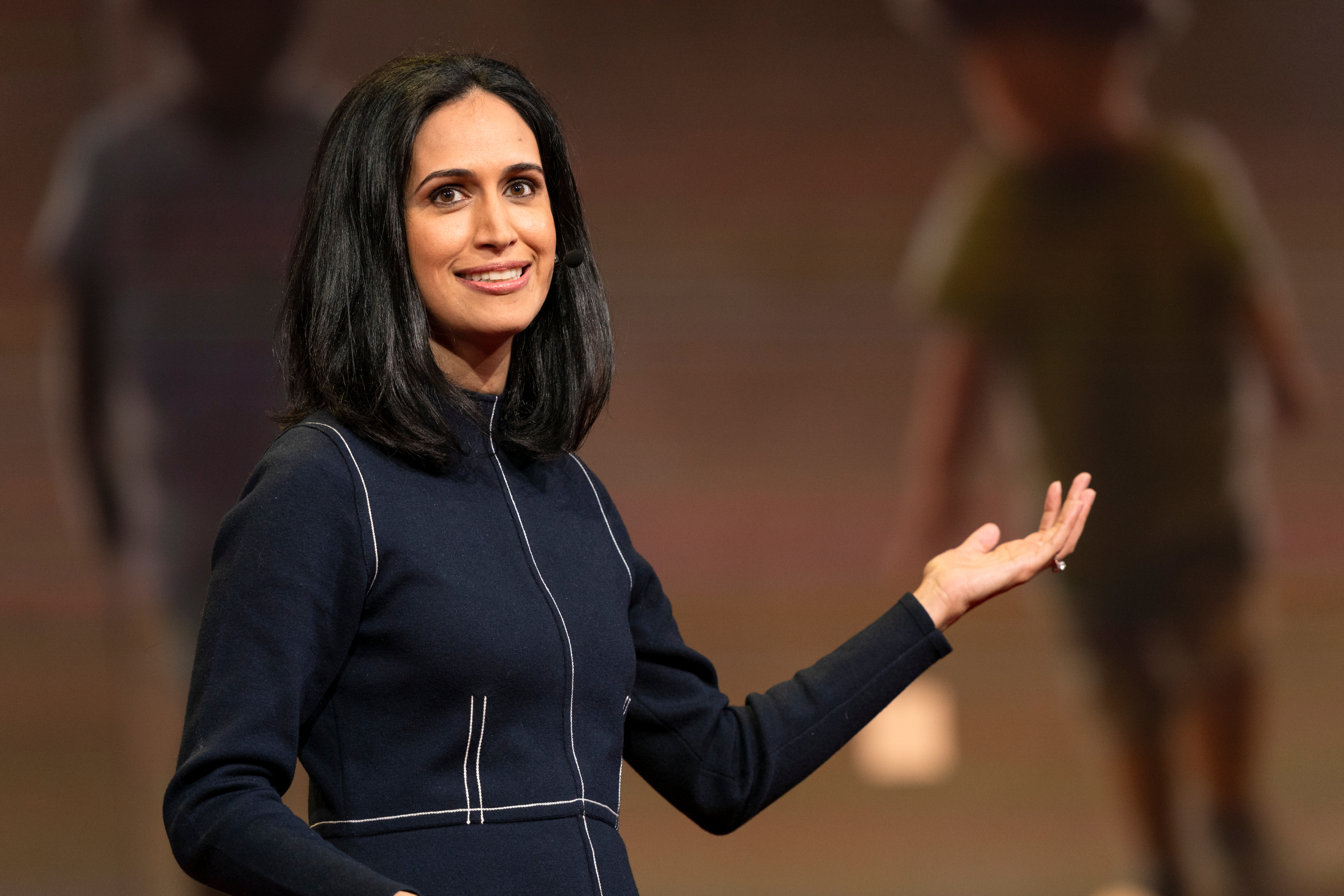
“For those who can and choose to, may you pass on this beautiful thing called life with kindness, generosity, decency and love,” says Wajahat Ali at TED2019: Bigger Than Us, on April 18, 2019, at Vancouver, BC, Canada. (Photo: Ryan Lash / TED)
Sometimes it feels like the world is fraying. Like our long-hold truths turn out, in an instant, to be figments of the imagination. Amid this turmoil, how can we strengthen connection, create more fulfilling lives? Speakers from Session 10 offer a range of provocative answers.
The event: Talks from TED2019, Session 10: Connection, hosted by TED’s head of curation, Helen Walters, and assistant curator Zachary Wood
When and where: Thursday, April 18, 2019, 2:30pm, at the Vancouver Convention Centre in Vancouver, BC
Speakers: Kishore Mahbubani, Wajahat Ali, Priya Parker, Barbara J. King and Jon M. Chu
The talks in brief:
Kishore Mahbubani, author and public policy expert
- Big idea: The West needs to adapt its strategy for working with the growing Asian economy.
- How? Asia has, Mahbubani says, experienced three silent revolutions in recent decades that powered its growth as a global power: one in economics, one in outlook and a third in improved governance. While he believes these have been, at least in part, due to the spread of “Western wisdom,” he feels the West became distracted while Asia rose. Mahbubani recommends that the West adopt a strategy of minimalist intervention in other societies and embrace multilateral collaboration — especially as it makes up only 12 percent of the global population.
- Quote of the talk: “Clearly minimalism can work. The West should try it out.”
Wajahat Ali, journalist and lawyer
- Big idea: Falling birth rates around the world will have catastrophic effects. By increasing access to health and child care, we can make it easier — and cheaper — to have children.
- How? Having children is expensive and difficult, but it’s necessary for the sake of our future. Our planet’s challenge moving forward isn’t overpopulation, Ali says, but underpopulation: Young people aren’t having enough kids — and this is a nearly universal problem. In China and Europe, for instance, shrinking populations could lead to labor shortages, catalyzing economic calamity. Aging populations have always relied on younger generations to care for them — we lose this, too, when we don’t have children. So, what’s stopping people from having kids? Mostly, it’s the cost. Governments need to provide child care, health care and paid parental leave so that more people can have kids and we can secure the future.
- Quote of the talk: “Babies have always represented humanity’s best, boldest, most beautiful infinite possibilities. If we opt out and don’t invest in present and future generations, then what’s the point?”

Priya Parker teaches us how we can gather better at home, at work, over holiday dinners and beyond. She speaks at TED2019: Bigger Than Us, on April 18, 2019, at Vancouver, BC, Canada. (Photo: Ryan Lash / TED)
Priya Parker, conflict mediator and author
- Big idea: In our multicultural, intersectional society, we can change our everyday get-togethers (parties, dinners, holidays) into meaningful and transformative gatherings.
- How? With just three straightforward, yet playful, steps: embrace a specific purpose, cause good controversy and create a thoughtful set of one-time rules for attendees to follow. It may sound odd, but when diverse groups are temporarily allowed to change and harmonize their behavior, something amazing happens: people find a way into each other without discomfort. Collective meaning is attainable in modern life, Parker says, when we’re intentional about how and why we interact.
- Quote of the talk: “The way we gather matters, because how we gather is how we live.”
Barbara J. King, biological anthropologist and writer
- Big idea: Animals grieve, much like humans do. Once we accept that grief — and the love from which it emerges — doesn’t belong to humans alone, we can make a better, kinder world for animals.
- How? After losing a family or tribe member, animals may rock, pace or wail. They often withdraw socially, fail to eat and sleep — as happened with the orca Tahlequah, who made global headlines for mourning the loss of her offspring. Many scientists still dispute animal grief, claiming its the work of our own anthropomorphism. Yet by comparing animals’ pre- and post-death behavior, King sees undeniable proof that some animals do indeed grieve. Will science one day report on bereaved bees? Likely not. On toads who mourn? King doesn’t expect so, since the ability to form meaningful, one-to-one relationships is the key to animal grief, and not all species do it. But in knowing, for example, that orcas feel deeply and elephants love, we can fight the mistreatment of the creatures we share this planet with — and create a kinder, safer world for all.
- Quote of the talk: “Animals don’t grieve like we do, yet it’s just as real: it’s searing. We can see it if we choose.”

Jon M. Chu makes up stories for a living. On the heels of the breakout success of his film Crazy Rich Asians, he reflects on the origin of his artistic inspiration at TED2019: Bigger Than Us, on April 18, 2019, at Vancouver, BC, Canada. (Photo: Bret Hartman / TED)
Jon M. Chu, filmmaker, director of Crazy Rich Asians
- Big idea: Film offers us the power of connection to something bigger than ourselves.
- How? The son of immigrant parents, Chu remembers that his family never felt “normal” – mostly because they never saw themselves represented on screen. But after his father equipped him with a video recorder on their family vacation, everything changed. He showed his family the footage afterward, and they cried — finally, they felt like they belonged. In the decades since, Chu made a number of Hollywood hits, but found himself at creative loss a couple years ago. That’s when Crazy Rich Asians came along — and the rest is history. Millions of people just like his family saw themselves represented on the big screen, feeling pride in their existence and story. He credits his success to connections he’s made throughout life — the ones that were sparked by generosity, kindness and hope. Read more about Jon M. Chu’s TED Talk.
- Quote of the talk: “Once you start listening to those silent beats in the messy noise all around you … you realize there is a beautiful symphony already written for you, and it can give you a direct line to your destiny – to your superpowers.”